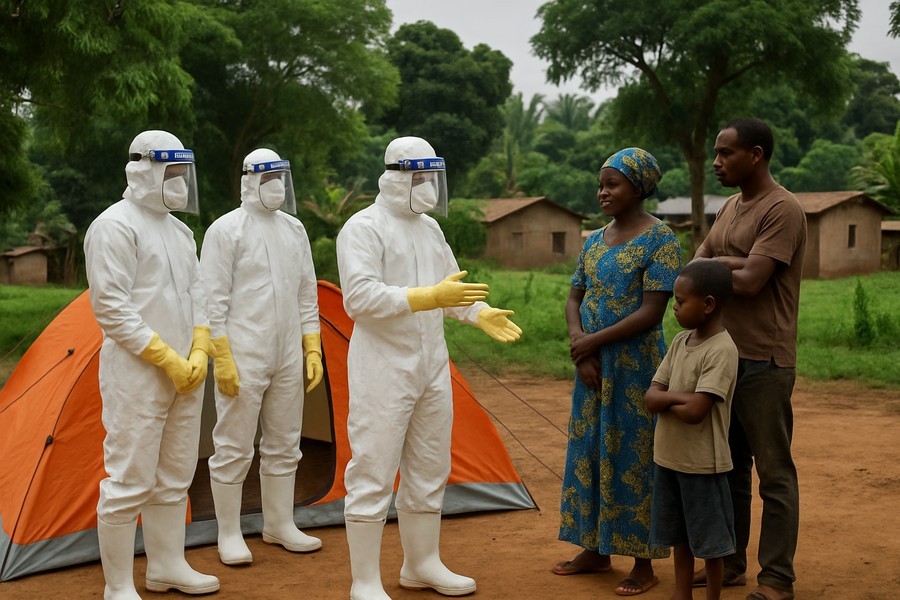
Emergence of a New Ebola Outbreak in Congo
Authorities in Congo have recently reported a new outbreak of the deadly Ebola virus, which has already claimed over a dozen lives in a southern province of the country. Tests conducted at a prominent research institute in Kinshasa, the capital, confirmed the presence of the most lethal strain of the virus, often referred to as "Zaire," the former name of the country.
This alarming revelation comes at a time when the country is grappling with escalated conflicts in the east and a weakened health care system due to a reduction in international aid.
Understanding Ebola Transmission
The Ebola virus is extremely infectious and first spreads to humans from wild animals. The virus then continues to spread within the human population through contact with body fluids such as vomit, blood, or semen, and with surfaces and materials, like bedding and clothing, contaminated with these fluids.
The disease caused by the virus is a rare but severe — and often deadly — illness in people. Symptoms include fever, vomiting, diarrhea, muscle pain, and in some cases, internal and external bleeding.
The Ebola virus was initially identified in 1976, near the Ebola lake in what is currently Congo. The initial outbreaks were observed in remote villages in Central Africa, near tropical rainforests.
The Latest Outbreak
The most recent outbreak of Ebola in Congo has resulted in more than a dozen fatalities. The first confirmed case was a 34-year-old pregnant woman from the Boulapé locality, in the Mweka territory, in southern Kasai province. She had been admitted to a local hospital with symptoms of hemorrhagic fever, and tragically passed away a few hours later due to multiple organ failure.
This latest outbreak is believed to have caused 15 deaths among 28 individuals showing symptoms, including four healthcare workers, according to the ministry. The estimated fatality rate of 53.6% underscores the serious nature of the situation.
The World Health Organization has warned that the number of cases is likely to grow. As the transmission is ongoing, response teams and local health workers are striving to identify potential cases and provide necessary care to minimize the spread of the virus.
Local health officials have also voiced concerns about a potential spike in infections, as many residents have fled their villages fearing contamination. This makes it challenging to track and monitor those who fall ill.
All four health zones in the territory have received suspected cases, according to the head of the Mweka health zone.
Previous Outbreaks in Congo
The last Ebola outbreak in Congo's northeastern Equateur province in 2022 caused six fatalities. An earlier outbreak in the eastern part of the country between 2018 and 2020 claimed over 1,000 lives, representing the highest death toll after the 2014-2016 outbreak in West African countries of Guinea, Sierra Leone, and Liberia that resulted in more than 11,000 deaths.
Efforts to control the epidemic in eastern Congo have been hindered by a volatile security situation and deep-rooted community mistrust. Ebola treatment centers have been repeatedly attacked, forcing government health officials to staff clinics in the high-risk areas of Butembo and Katwa.
Preventing the Spread of the Disease
Health officials are urging the general public to strictly adhere to preventive measures such as social distancing and regular handwashing. The World Health Organization has dispatched experts to Kasai province to bolster disease surveillance, treatment provision, and infection prevention in health facilities. It is also delivering essential supplies, including personal protective equipment, mobile laboratory gear, and medicines.
A team of experts from a national research institute has been deployed to the Mweka health zone. They have established a mobile laboratory to test samples taken from patients on site.
"The main challenges we face involve the lack of personnel and the shortage of personal protective equipment," said the head of the Mweka health zone. "Beyond that, our hospitals need to be supplied with medicines and special equipment capable of addressing this epidemic."
In an effort to curb the spread of the virus, local authorities have implemented partial confinement measures. These include the suspension of classes and graduation ceremonies and the closure of weekly markets.
